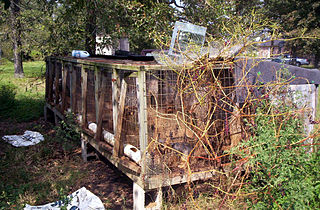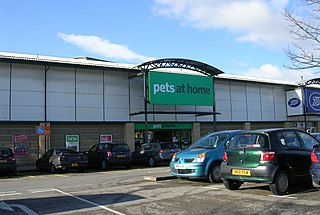The American Society for the Prevention of Cruelty to Animals (ASPCA) is a non-profit organization dedicated to preventing animal cruelty. Based in New York City since its inception in 1866, the organization's mission is "to provide effective means for the prevention of cruelty to animals throughout the United States."

Pet adoption is the process of transferring responsibility for a pet that was previously owned by another party. Common sources for adoptable pets are animal shelters, rescue groups, or other pet owners. Some organizations give adopters ownership of the pet, while others use a guardianship model wherein the organization retains some control over the animal's future use or care.

An animal shelter or pound is a place where stray, lost, abandoned or surrendered animals – mostly dogs and cats – are housed. The word "pound" has its origins in the animal pounds of agricultural communities, where stray livestock would be penned or impounded until they were claimed by their owners.

A puppy mill, also known as a puppy farm, is a commercial dog breeding facility characterized by quick breeding and poor conditions. Although no standardized legal definition for "puppy mill" exists, a definition was established in Avenson v. Zegart in 1984 as "a dog breeding operation in which the health of the mill’s dogs is disregarded to maintain a low overhead and maximize profits". They are cited as being a result of increased demand for household pets, especially after World War II. The Veterinary Medical Association of the Humane Society of the United States defines the main characteristics of a puppy mill as "emphasis on quantity over quality, indiscriminate breeding, continuous confinement, lack of human contact and environmental enrichment, poor husbandry, and minimal to no veterinary care."

Trap–neuter–return (TNR), also known as trap–neuter–release, is a controversial method that attempts to manage populations of feral cats. The process involves live-trapping the cats, having them neutered, ear-tipped for identification, and, if possible, vaccinated, then releasing them back into the outdoors. If the location is deemed unsafe or otherwise inappropriate, the cats may be relocated to other appropriate areas. Ideally, friendly adults and kittens young enough to be easily socialized are retained and placed for adoption. Feral cats cannot be socialized, shun most human interaction and do not fare well in confinement, so they are not retained. Cats suffering from severe medical problems such as terminal, contagious, or untreatable illnesses or injuries are often euthanized.

Cruelty to animals, also called animal abuse, animal neglect or animal cruelty, is the infliction by omission (neglect) or by commission by humans of suffering or harm upon non-human animals. More narrowly, it can be the causing of harm or suffering for specific achievements, such as killing animals for entertainment; cruelty to animals sometimes encompasses inflicting harm or suffering as an end in itself, referred to as zoosadism. Divergent approaches to laws concerning animal cruelty occur in different jurisdictions throughout the world. For example, some laws govern methods of killing animals for food, clothing, or other products, and other laws concern the keeping of animals for entertainment, education, research, or pets. There are several conceptual approaches to the issue of cruelty to animals.

A pet shop or pet store is an essential services retailer which sells animals and pet care resources to the public. A variety of animal supplies and pet accessories are also sold in pet shops. The products sold include: food, treats, toys, collars, leashes, cat litter, cages and aquariums.
An animal rescue group or animal rescue organization is a group dedicated to pet adoption. These groups take unwanted, abandoned, abused, or stray pets and attempt to find suitable homes for them. Many rescue groups are created by and run by volunteers, who take animals into their homes and care for them—including training, playing, handling medical issues, and solving behavior problems—until a suitable permanent home can be found.
In some countries there is an overpopulation of pets such as cats, dogs, and exotic animals. In the United States, six to eight million animals are brought to shelters each year, of which an estimated three to four million are subsequently euthanized, including 2.7 million considered healthy and adoptable. Euthanasia numbers have declined since the 1970s, when U.S. shelters euthanized an estimated 12 to 20 million animals. Most humane societies, animal shelters and rescue groups urge animal caregivers to have their animals spayed or neutered to prevent the births of unwanted and accidental litters that could contribute to this dynamic.
The Humane Society of the United States (HSUS) is an American nonprofit organization that focuses on animal welfare and opposes animal-related cruelties of national scope. It uses strategies that are beyond the abilities of local organizations. It works on issues including pets, wildlife, farm animals, horses and other equines, and animals used in research, testing and education. As of 2001, the group's major campaigns targeted factory farming, animal blood sports, the fur trade, puppy mills, and wildlife abuse.
A no-kill shelter is an animal shelter that does not kill healthy or treatable animals based on time limits or capacity, reserving euthanasia for terminally ill animals, animals suffering poor quality of life, or those considered dangerous to public safety. A no-kill shelter uses many strategies to promote shelter animals; to expanding its resources using volunteers, housing and medical protocols; and to work actively to lower the number of homeless animals entering the shelter system. Up to ten percent of animals could be killed in a no-kill shelter and still be considered a no-kill shelter.
Best Friends Animal Society, (BFAS) founded in its present form in 1993, is an American nonprofit 501(c)(3) animal welfare organization based in Kanab, Utah with satellite offices in Atlanta, Georgia, Bentonville, Arkansas, Houston, Texas, Los Angeles, California, New York City, and Salt Lake City, Utah. It also has a partnership network with shelters, rescue groups and members in all 50 states and Washington, DC, to promote pet adoption, no-kill animal rescue, and spay-and-neuter practices. Best Friends has a 3-star 'Give With Confidence' rating from Charity Navigator.

The Nova Scotia Society for the Prevention of Cruelty (Nova Scotia SPCA) is a not-for-profit charitable society organized under the Animal Protection Act of the Canadian province of Nova Scotia. The Society is dedicated to the prevention of cruelty to animals and to the promotion of respect and humane care for animals. Its members are committed to providing humane leadership in animal advocacy, protection, education, and veterinary care.
The National Animal Interest Alliance (NAIA) is a non-profit organization in the United States dedicated to promoting animal welfare and animal husbandry practices, strengthening the human-animal bond, and safeguarding the rights of responsible animal owners and professionals through research, public education and public policy. The NAIA mission is "to promote the welfare of animals."

Compassion and Responsibility for Animals (CARA) is a registered non-profit, non-government animal welfare organization in the Philippines. It was founded in 2000 by a group of animal lovers determined to help the plight of animals in the Philippines. The current president of CARA is Nancy Cu-Unjieng.
Abandoned pets are companion animals that are either inadvertently or deliberately abandoned by their owners, by either dumping the animals on the streets, leaving them alone in a vacant property, or relinquishing them at an animal shelter.
World Spay Day advocates spaying, or neutering, advocating it "as a proven means of saving the lives of companion animals, community cats, and street dogs who might otherwise be put down in a shelter or killed on the street." It is an event held on the last Tuesday in February each year.
The Lange Foundation is a 501(c)(3) non-profit organization founded in 1993 in West Los Angeles, California, by Gillian Lange. The organization is a no-kill shelter committed to rescuing stray and abandoned animals and facilitating adoptions. Animals that are not adopted may remain at the kennel indefinitely without consequence.

Petland is a privately owned operator and franchisor of pet stores based in Chillicothe, Ohio. Ed Kunzelman founded the company in 1967. Petland currently operates 131 stores in the United States, and at least 63 in foreign markets including Canada, Japan, China, Mexico, Brazil and El Salvador. The chain is notable for its controversy over documentation from the Humane Society of the United States revealing the purchase of dogs from puppy mills.
The Richmond SPCA is an idependent non-profit animal shelter in Richmond, Virginia founded in 1891.









